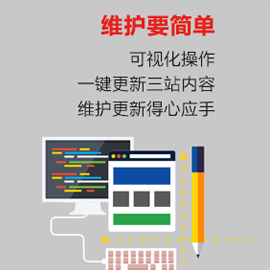c语言调用pop函数 c语言中pop函数
C语言写Pop函数取栈的出错
Pop函数改成这样:

创新互联自2013年创立以来,先为禹州等服务建站,禹州等地企业,进行企业商务咨询服务。为禹州企业网站制作PC+手机+微官网三网同步一站式服务解决您的所有建站问题。
int Pop (Stack * pstack, int * pname)
{
if(pstack-top=0)
{
return 0;
}
pstack-top--;
* pname = pstack-data[pstack-top];
return 1;
}
Push函数改成这样:
int Push (Stack * pstack, int num)
{
if(pstack-top=Stack_size)
{
printf("Push Error!");
return 0;
}
pstack-data[pstack-top]=num;
pstack-top++;
return 0;
}
试试(原来那样当元素达到最大数目时pstack-top就越界了)。
C语言中的pop函数是什么单词的缩写
关于 pop 函数,我不太确定题主说的是哪个函数,因为 C 语言的标准函数库是没有 pop 这个函数的。如果题主说的是 C++ 的 Stack 类中的 pop 函数的话,它并不是一个缩写,因为从栈中取值的操作就叫做 pop。
然后就是查询单词原型的网站,因为 C 语言好多函数库中的函数名都是按照很奇怪的方法缩写的,所以基本上没有一个专门查全称的网站。不过题主可以参考
这个网站里面虽然没有指出具体的缩写方式,但是能很好地解释 C 语言标准函数库的所有函数的作用。通过它的介绍你应该会对函数的全称有一个大概的理解。比如说这个针对 stdio.h 头文件中所定义函数的解释:
不光是 C 语言,C++ 的标准类库的信息也可以在这个网站中找到。
“c语言”中,“pop函数”和“push函数”的作用分别是什么?
这个算是数据结构的内容讲解的是一个叫做栈类型的数据结构,这个数据结构的特点就是后进先出--最后放进去的数据最先拿出来。pop函数就是拿出数据的操作,push是放入是数据的操作。
内容拓展:
pop函数呵push函数的使用:
#include stdio.h
#include unistd.h
#include pthread.h
void *clean(void *arg)
{
printf("cleanup: %s \n",(char *)arg);
return (void *)0;
}
void * thr_fn1(void * arg)
{
printf("chread 1 start \n");
pthread_cleanup_push((void *)clean,"thraed 1 first handler");
pthread_cleanup_push((void *)clean,"thread 1 second handler");
printf("thread 1 push complete \n");
if(arg)
{
return ((void *)1);
}
pthread_cleanup_pop(0);
pthread_cleanup_pop(0);
return (void *)1;
}
//输出结果: chread 1 start -thread 1 push complte
//push和pop框起来的代码,不管正常退出还是异常退出,都将执行清除函数,但是存在特例:不包括return 退出。
C语言 push和pop函数可以直接用吗?
#include stdio.h
#include stdlib.h
#define MAXSIZE 32
typedef struct{
int *elem;/* 栈的存储区 */
int max; /* 栈的容量,即找中最多能存放的元素个数 */
int top; /* 栈顶指针 */
}Stack;
int InitStack(Stack *S, int n) /*创建容量为n的空栈*/
{
S-elem = (int *)malloc(n * sizeof(int));
if(S-elem==NULL) return -1;
S-max=n;
S-top =0; //栈顶初值0
return 0;
}
int Push(Stack *S, int item) /*将整数item压入栈顶*/
{
if(S-top==S-max) {
printf("Stack is full! \n");
return -1;
}
S-elem[S-top++] = item; //压栈,栈顶加1
return 0;
}
int StackEmpty(Stack S)
{
return (!S.top)?1:0; /*判断栈是否为空*/
}
int Pop(Stack *S) /*栈顶元素出栈*/
{
if(!S-top) {
printf("Pop an empty stack!\n");
return -1;
}
return S-elem[--S-top] ; //弹出栈,栈顶减1
}
void MultibaseOutput(long n,int B)
{
int m; Stack S;
if(InitStack(S,MAXSIZE)){
printf("Failure!\n");
return;
}
do {
if (Push(S,B )) //------
{
printf("Failure!\n");
return;
}
n= n-1 ; //--------
}while(n!=0);
while(!StackEmpty(S)) { /*输出B进制的数*/
m=Pop(S);
if(m10) printf("%d",m); /*小于10,输出数字*/
else printf("%c", m+55); /*大于或等于10,输出相应的字符*/
}
printf("\n");
}
c语言 函数参数传递 int pop(int *s, int *e)
在函数定义时写int
pop(int
s,
int
e)是说明参数是直接引用的参数
在函数调用时写pop(a,
b);[注意这个不是函数定义,而是调用语句],
这里的是取地址的运算,与函数参数定义时的不是同一个含义,因此在这里不能理解是引用传递的意思,而是取a和b的地址传递给函数的参数变量s和e(应该是调用第3个函数)
第2个函数调用直接写pop(a,b);即可实现
文章名称:c语言调用pop函数 c语言中pop函数
网页URL:https://www.cdcxhl.com/article22/hisocc.html
成都网站建设公司_创新互联,为您提供网站改版、网站内链、做网站、企业网站制作、、响应式网站
声明:本网站发布的内容(图片、视频和文字)以用户投稿、用户转载内容为主,如果涉及侵权请尽快告知,我们将会在第一时间删除。文章观点不代表本网站立场,如需处理请联系客服。电话:028-86922220;邮箱:631063699@qq.com。内容未经允许不得转载,或转载时需注明来源: 创新互联

- 营销网站在用户体验和操作方面有什么特点 2023-01-12
- 加强用户体验的网站制作:产品工程师和WEB前端工程师 2021-08-19
- 怎么样才可以提高网站的用户体验? 2021-05-26
- 创新互联怎么做才能提升网站的用户体验度 2022-06-04
- 德州百度快照【移动端页面优化】移动端内容与用户体验如何彼此融合? 2023-01-29
- 用户转化率低多半是网站用户体验不够友好造成的 2023-03-31
- 增强网站用户体验的方法 2022-04-11
- 网站制作中从哪些方面提升网站的用户体验 2021-01-19
- 北京网页设计中提升用户体验的方法 2022-03-09
- 为什么说网络营销中的用户体验很重要? 2015-05-16
- 社交媒体是用户体验的一部分 2022-05-06
- 网站的颜色如何影响用户体验 2016-04-13